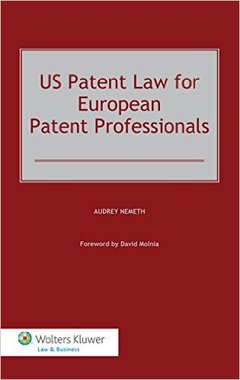Description
US Patent Law for European Patent Professionals
Author: NEMETH Audrey
Language: English
Subject for US Patent Law for European Patent Professionals:
Approximative price 158.59 €
In Print (Delivery period: 14 days).
Add to cart
Publication date: 04-2015
215 p. · Hardback
215 p. · Hardback
Description
/li>
United States patent law, like the European Patent Convention (EPC), is
based on a hierarchical code of statutes, regulations and administrative
guidelines. However, there are numerous important distinctions, knowledge
of which is crucial to successfully protect and leverage intellectual
property in the United States. In this highly practical, one-of-a-kind
book, European patent professionals will find, detail by detail, exactly
what is required at every stage of a patent proceedings in the United
States. Using a directly comparative presentation, the coverage includes
such details of patent law and procedure as the following: · drafting
applications and filing them at the US Patent Office; · provisions of the
America Invents Act of 2011; · possible responses to a Final Office
Action; · US definitions of novelty and inventiveness; · types of patents
recognized in the United States; · structure of the US Patent Office and
the US court system; · variations in the definitions of basic
patentability criteria; · types of US post-grant proceedings and
third-party submissions; · appeal proceedings at the US Patent and
Trademark Office; · inventors oath; · foreign filing license; · cost and
time periods for various procedural acts; · the work of US patent
attorneys, agents and examiners; · uses of the US Manual of Patent
Examination Procedure (MPEP); and · the US provisional application
procedure. Every step in the process is described and directly compared as
it operates under both the EPC and US patent law. There is no other
available source of such instantly accessible information for European
patent lawyers, in-house counsel, or EPC or national patent office
officials, to all of whom this book will be of immeasurable value and
usefulness. Intellectual property law academics and students will also
benefit from the books rigorous comparative approach.
© 2024 LAVOISIER S.A.S.




